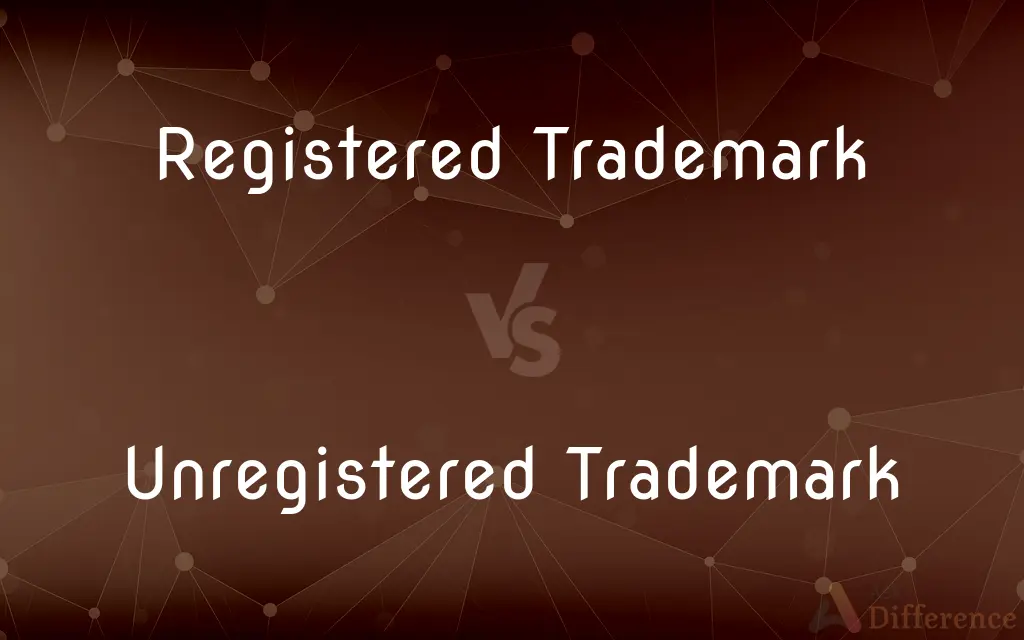Registered Trademark vs. Unregistered Trademark — What's the Difference?
By Tayyaba Rehman — Published on November 17, 2023
Registered Trademark is an officially recognized symbol, word, or logo. Unregistered Trademark is a symbol, word, or logo used in commerce without official registration.

Difference Between Registered Trademark and Unregistered Trademark
Table of Contents
ADVERTISEMENT
Key Differences
A Registered Trademark is a unique symbol, word, or logo that has been officially registered with the appropriate government body, signifying protection under the law. Conversely, an Unregistered Trademark, while still representing a company or product, hasn't been officially registered with the government.
The Registered Trademark offers the owner exclusive rights to use that mark in connection to their goods or services, often indicated by the ® symbol. In contrast, the Unregistered Trademark, often signified by the ™ symbol, doesn't grant the same level of legal protection but still asserts ownership and origin of a brand.
When it comes to enforcement, the Registered Trademark gives its owner the legal ability to prevent others from using a confusingly similar mark in the same or related fields of commerce. The Unregistered Trademark, though offering some common law rights, doesn't provide the same extent of protection against potential infringers.
For a Registered Trademark, the registration process involves various steps, including application, examination, and potential opposition. This ensures the mark's distinctiveness and avoids consumer confusion. An Unregistered Trademark, while simpler in its adoption, doesn't undergo such a vetting process and might encounter more challenges in establishing its unique association with specific goods or services.
Finally, the duration and renewal of rights differ between the two. A Registered Trademark, upon successful registration, provides protection for a set period and can be renewed. An Unregistered Trademark, while not limited by a specific term, depends on continuous use in commerce to maintain its recognition and any associated common law rights.
ADVERTISEMENT
Comparison Chart
Legal Protection
Provides strong legal protection.
Offers limited common law protection.
Symbol
Denoted by the ® symbol.
Denoted by the ™ symbol.
Enforcement
Can prevent others using similar marks.
Harder to enforce rights against infringers.
Registration Process
Involves application, examination, and potential opposition.
No formal registration process.
Duration & Renewal
Has a set term but can be renewed.
Depends on continuous use in commerce.
Compare with Definitions
Registered Trademark
A symbol protected under law.
Infringing on a Registered Trademark can lead to legal consequences.
Unregistered Trademark
An assertion of branding without legal vetting.
Despite being an Unregistered Trademark, their logo is well-recognized.
Registered Trademark
A brand's legally recognized identifier.
The ® next to their name signifies it's a Registered Trademark.
Unregistered Trademark
A brand symbol without formal recognition.
They use the logo as an Unregistered Trademark to indicate their brand identity.
Registered Trademark
An official mark of brand ownership.
Their logo is a Registered Trademark, so others can't use it without permission.
Unregistered Trademark
A claim of brand ownership without official registry.
Their logo is an Unregistered Trademark, so they use the ™ symbol.
Registered Trademark
An exclusive right granted after vetting.
After passing the examination, their symbol became a Registered Trademark.
Unregistered Trademark
A mark asserting brand association.
Even as an Unregistered Trademark, their logo is distinct in the market.
Registered Trademark
A sign of unique brand distinction.
The company worked hard to obtain a Registered Trademark for its logo.
Unregistered Trademark
A sign of brand identity without legal registration.
They've been using their Unregistered Trademark for years, building brand recognition.
Common Curiosities
Can an Unregistered Trademark be legally enforced?
While it offers some common law rights, an Unregistered Trademark doesn't provide the same legal protection as a registered one.
What signifies an Unregistered Trademark?
An Unregistered Trademark is a symbol, word, or logo used in commerce without official registration, often denoted by the ™ symbol.
How is a Registered Trademark represented?
A Registered Trademark is typically denoted by the ® symbol.
Does an Unregistered Trademark have any value?
Yes, an Unregistered Trademark can have value in terms of brand recognition and some common law rights.
Can I challenge a Registered Trademark?
Yes, during its application process, there's usually a phase where oppositions can be filed.
What's a Registered Trademark?
A Registered Trademark is an official symbol, word, or logo registered with a government body, granting legal protection and exclusive rights.
Do I need to register my brand logo?
While not mandatory, registering provides stronger legal protection against infringers than an Unregistered Trademark.
Can I use the ® symbol without registering?
No, the ® symbol is exclusively for Registered Trademarks. Using it otherwise can have legal repercussions.
Can two businesses have similar Unregistered Trademarks?
Yes, but it can lead to consumer confusion and potential legal disputes based on common law rights.
Is an Unregistered Trademark recognized internationally?
An Unregistered Trademark's recognition is generally limited and doesn't provide the same international protections as a registered one.
Can an Unregistered Trademark become registered?
Yes, an Unregistered Trademark can be registered, subject to meeting government criteria.
What are the benefits of a Registered Trademark?
A Registered Trademark offers exclusive rights, strong legal protection, and easier enforcement against infringers.
How long is a Registered Trademark valid?
A Registered Trademark typically has a set term (often 10 years in the U.S.) but can be renewed.
What's the process to get a Registered Trademark?
It involves application, examination, potential opposition, and eventual registration with a government body.
How do I protect my Unregistered Trademark?
While legal protections are limited, consistent use in commerce and establishing brand recognition can offer some common law rights.
Share Your Discovery

Previous Comparison
Cold Booting vs. Warm Booting
Next Comparison
Hold Up vs. Hold OnAuthor Spotlight
Written by
Tayyaba RehmanTayyaba Rehman is a distinguished writer, currently serving as a primary contributor to askdifference.com. As a researcher in semantics and etymology, Tayyaba's passion for the complexity of languages and their distinctions has found a perfect home on the platform. Tayyaba delves into the intricacies of language, distinguishing between commonly confused words and phrases, thereby providing clarity for readers worldwide.














































